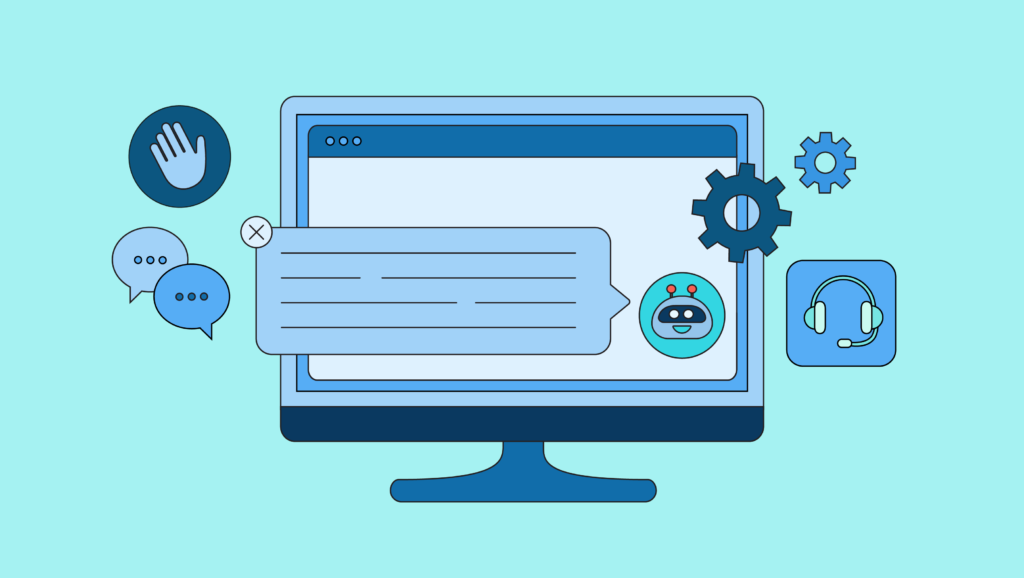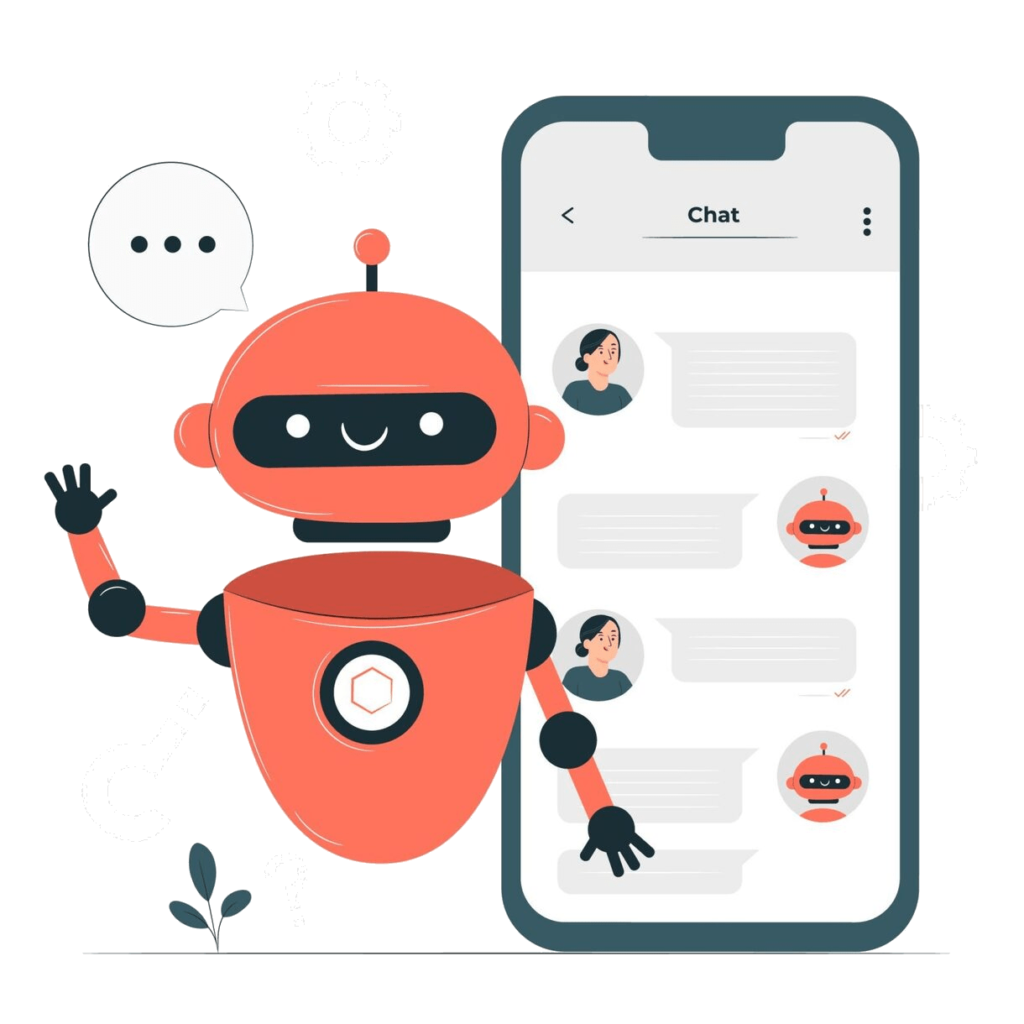Introduction
We’ve all been there – surfing through an e-commerce site and suddenly, a pop-up window emerges with a friendly “How may I help you?” That’s a chatbot for you. These AI-driven helpers are revolutionizing the e-commerce industry and are more common now than ever before.
Understanding the role of AI in E-commerce
E-commerce is a fast-growing sector with a dire need for quick, accurate, and effective customer interactions. Enter AI chatbots. They cover all these bases and more, providing 24/7 customer service, answering queries in real-time, offering purchase suggestions, and even upselling products. They’re your customers’ best friend and your profit margins’ secret partner.
Moreover, AI chatbots collect valuable data about your customers’ preferences, allowing you to tailor your offerings and boost your conversion rate. In nutshell, the role of AI in e-commerce is to make sales smoother, easier, and more profitable.
Chatbots: From Concept to Implementation
A few years ago, the idea of machines talking in human-like language seemed very futuristic. Today, it’s a reality ever-present in online business. From initial conception of simply automating FAQs, chatbots have evolved immensely, now capable of simulating human intelligence.
But how do we get them from the idea stage to implementation? Well, it involves clearly defining the chatbot’s function, setting up the AI (intents, entities, dialogues), testing it thoroughly, and finally integrating it into your business platforms.
Ultimately, it’s evident that AI chatbots are a massive asset in e-commerce. They offer a personalized, efficient customer experience, enhancing customer satisfaction and, consequently, your bottom line. It’s time we embrace them and let them revolutionize our online ventures.

This image is property of media.sproutsocial.com.
Chatbots in E-commerce: Exploring the Importance
As an online business owner, I’ve observed an interesting shift in the digital landscape – the rise of chatbots. These AI-powered tools are now an integral part of e-commerce, boosting profits and revolutionizing the way businesses operate. In this post, I want to dive deep into the importance of chatbots in e-commerce, exploring three main areas: enhancing customer experience, streamlining business operations, and providing 24/7 customer service.
Enhancing customer experience
Let’s begin with customer experience – a key aspect guiding the success of any business. I’ve realized that chatbots offer an efficient, personalized, and instantaneous approach to serving customers. For example, they can suggest products based on browsing history or answer common queries without any human intervention. What an amazing way to create a unique and satisfying shopping experience, isn’t it? And the best part is when customers are happy, they spend more, enhancing our overall profits.
Streamlining business operations
Moving onto the operational aspect, chatbots have proven invaluable. Through AI algorithms, chatbots can process orders, manage inventories, and even handle complaints, freeing up time and resources for other critical business tasks. Plus, the negligible error rate compared to manual processes reduces operational costs significantly.
Providing 24/7 customer service
Finally, the importance of chatbots in providing round-the-clock customer service is certainly worth mentioning. Here, chatbots come to the rescue, answering queries and resolving issues at any time of day, without incurring additional personnel costs. Suffice to say, with chatbots, businesses are ‘always open’, making the shopping experience seamless for customers across time zones.
In essence, integrating chatbots in our e-commerce strategies can greatly boost profits, enhancing customer experiences, improving operational efficiency, and offering constant support. Evidently, the question isn’t whether we should adopt chatbots, but rather how soon. AI is the future of e-commerce and it’s high time we leverage it to its full potential.
Illustrating the Mechanism of Chatbots
Over the past few years, I’ve seen a growing trend in the E-commerce industry – Artificial Intelligence (AI). More specifically, AI-powered chatbots. These bots serve as virtual assistants, bridging the communication gap between clients and businesses, and simultaneously improving customer experience. In this post, I would like to delve into the workings of these chatbots and how they play a role in bringing in profits for e-commerce businesses.
Defining Chatbots: The AI-powered assistant
Chatbots are essentially a type of software that can engage in conversations, create personalized responses, assist with tasks, and essentially operate as a virtual concierge. The biggest advantage is that they are available 24/7, providing real-time solutions to customer’s queries.
But how does a chatbot converse? How does it know what to say? Essentially a chatbot ‘understands’ what a customer is asking or needing through Natural Language Processing (NLP), a form of AI technology. Depending on how they are programmed, chatbots can provide a wide range of responses or perform a series of tasks, such as scheduling appointments, making product recommendations, and disseminating promotional offers – all geared towards enhancing the customer experience.
The Operational Framework of Chatbots
So that brings us to a key question. How do chatbots work? Well, the process is somewhat complex, but incredibly interesting. Chatbots are set up with pre-programmed responses to specific inputs or instructions. Then, through Machine Learning, a subset of AI, they adapt, learning from each conversation and interaction to refine their response accuracy. There’s a lot of testing and fine-tuning to get it right.
As the bot interacts more with customers, it learns and adapts to better answer questions and assist users, ultimately reducing manual work, speeding up response time, and allowing businesses to capitalize on those improved efficiencies, invariably driving the profit margins higher.
That’s the beauty of chatbots: continuous learning, evolving, and profit-making mechanisms, all powered by AI. In future posts, we’ll delve into some of the successful use cases and benefits of incorporating chatbots into your e-commerce strategy.

This image is property of botnation.ai.
Empirical Analysis: Chatbots and Profitability
Over the past few years, I have witnessed e-commerce businesses adopting chatbots in droves. As I looked on, questions inevitably started to form in my mind. Are chatbots really translating into increased profits for these businesses? What is driving these profitability trends? So, I decided to dig deeper.
In this section, we will journey together through my exploratory analysis of the relationship between chatbots and profitability in the e-commerce industry. We’ll talk about profitability trends I’ve noted and explore how customer satisfaction might be influencing these.
Study of profitability trends
Many studies are indicating a positive correlation between deploying chatbots and increasing profit margins. As my own research broadened, I started to make some interesting observations. Some businesses reported increased sales, while others enjoyed significant cost reductions. Customer service departments in particular experienced some of the most notable improvements; thanks to chatbots, they could handle multiple customer queries simultaneously, reducing wait times for customers and operational costs for businesses.
Relationship between customer satisfaction and overall profits
So, where does customer satisfaction fit into all of this? Well, as businesses deployed chatbots, customer satisfaction rates spiked. This was largely due to faster response times and around-the-clock availability. But it’s more than just that. A satisfied customer is more likely to become a repeat customer, which means more purchases and referrals. In this way, chatbots contribute indirectly to a significant increase in profits.
There is a caveat, however. Chatbot experiences must be seamlessly integrated and easy to use; if they’re not, they can actually negatively impact customer satisfaction and, by extension, profits.
Diving deep into this correlative relationship between chatbots, customer satisfaction, and profitability has been fascinating. As we delve further into the nuances of AI in e-commerce, I hope you too will get to appreciate the multifaceted role that AI plays in shaping business profitability.

This image is property of siamcomputing.com.
Case Studies: Successful Utilization of Chatbots in E-commerce
Allow me to share some refreshing case studies which highlight how profitable AI-powered chatbots have proved to be in e-commerce. These studies demonstrate the impact that AI and chatbots have had on boosting customer service experience and escalating sales figures in e-commerce platforms.
Case Study 1: Superior Customer Service
Let’s look at an example of how AI-powered chatbots have transformed the way businesses serve their customers. An online multinational retailer introduced a chatbot to their customer service team, and it worked wonders for them. The chatbot was programmed to initially answer simple queries while complex issues were directed to the human team. However, over time, with machine learning capabilities, the bot was able to handle more complex inquiries as well. The result? Happy customers and soaring reviews, leading to increased repeat purchase rate!
Case Study 2: Increased Sales through Targeted Marketing
Here’s a fascinating example of an online fashion retailer who decided to implement a chatbot for their marketing strategy. The integration of the bot with their customer database enabled it to send personalized recommendations based on past purchases and browsing history. This data-driven marketing led to a significant increase in user engagement and subsequently, sales began to ramp up. Not only did the marketing expenses reduce, but there was also a substantial increase in the customer retention rate.
From these case studies, it’s apparent that chatbots, powered by AI, have proven to be a game-changing tool for e-commerce platforms. They are not only enhancing customer service experience but are also opening up new avenues for targeted marketing, leading to increased profits.

This image is property of cdn.technologyadvice.com.
Challenges in Integrating Chatbots
In this study, I will delve into the challenges associated with integrating chatbots into an e-commerce platform. As a cutting-edge technology, bringing chatbots into e-commerce requires addressing a range of technical and socio-ethical issues.
Resolving technical challenges
One of the significant hurdles to overcome lies in the technical domain. From programming the chatbot to comprehend and respond aptly to diverse customer queries to making it fit seamlessly into your existing technical architecture, the integration process is laden with complexities. However, keep this in mind – getting the technical aspects of your AI chatbot right is integral to its eventual efficacy. Be prepared to invest time and resources in extensive testing and debugging to refine the chatbot’s capabilities, ensuring a satisfying user experience.
Addressing data privacy concerns
Data privacy is an equally important concern when integrating chatbots into your e-commerce business. Consumers are becoming increasingly conscious about their data privacy, and the potential misuse of collected data by AI technologies is a hotly debated issue. The implication is clear – transparency must be integral to your chatbot’s design. Your customers should understand what data the chatbot is collecting, how it is being used, and how it’s protected. Encouragingly, privacy laws like the General Data Protection Regulation (GDPR) have set helpful guidelines in this regard.
In short, integrating chatbots into your e-commerce platform is a complex but rewarding undertaking. Emphasis on thorough testing and debugging, transparency and data privacy will go a long way in overcoming the challenges and eventually harnessing the power of AI for business profitability.
Opportunities for Future Expansion: Chatbots and Beyond
The explosion of technology has led to fascinating advancements in the world of e-commerce. Among these advancements, Artificial Intelligence (AI) is rapidly becoming a game-changer, especially when it comes to chatbots. In this piece, we will journey into the world of chatbots and its significance to e-commerce platforms and profits. Delving deeper, we will also touch on the potential future of chatbots in online business, particularly focusing on predictive analysis.
Analyzing emerging trends in AI
Be it customer service or sales, AI is transforming how businesses function. Chatbots have particularly been impressive, with their ability to learn from interactions and provide personalized responses. As an entrepreneur, this means better customer engagement, improved efficiency, and overall profit growth.
Predictive Analysis: The future of chatbots in e-commerce
Another incredible trend in AI is predictive analysis. Imagine chatbots that could accurately predict customer behavior! With the vast amount of data that e-commerce platforms can collect, predictive analysis seems like the next big step. Predictive chatbots could provide invaluable insights, revolutionizing the way businesses strategize their marketing campaigns and sales strategies. Consequently, this would result in better product recommendations, improved user experiences, and ultimately, higher profits.
In a nutshell, the landscape of e-commerce is ever-evolving, and technology is at its helm. By integrating AI and chatbots into your business, you could redefine your profitability and secure a strong foothold in the market. And with the promising future of predictive analysis, there’s no telling how much higher your profits can soar. Embrace the change, and brace for impact; the world of chatbots awaits!

This image is property of www.cxtoday.com.
Steps to Implement Chatbots in your E-commerce Business
The role of technology in driving profits is rapidly evolving and nowhere is this more evident than in the realm of e-commerce. A shining example of this is the increasing popularity of chatbots, AI-powered virtual assistants that act as customer service representatives. Implementing chatbots in your e-commerce business can have game-changing profits, ease the burden on human resources, and provide 24/7 customer service. However, there are few steps which should be considered before integrating it into your business.
Understanding your customer needs
The first step towards integrating chatbots should revolve around identifying and understanding your customer’s needs. It is important to clearly define what type of inquiries your business faces often and how incorporating a chatbot can help streamline these processes. For instance, if the majority of your customer service inquiries relate to tracking orders or checking availability of products, a chatbot can be programmed to handle these requests efficiently.
Choosing the right chatbot platform
Once you’ve identified your customer’s needs, the next step involves selecting the appropriate platform for your chatbot. There are several chatbot developers in the market, so make sure to pick one that’s best suited to your business’s needs. Whether it’s Microsoft’s Bot Framework, IBM’s Watson, or any other platform, the key is to pick a tool that offers the functionalities that your customers would most likely use.
Continuous monitoring and upgrades
Implementing a chatbot isn’t a ‘set and forget’ process. Just like any other part of your business, it requires continuous monitoring and updates. It’s necessary to routinely check how the chatbot is performing, as well as making adjustments as needed. Also, as more customers interact with your chatbot, it will learn and improve, so keep an eye on this to ensure it’s providing your customers with the best service possible. By following these steps, you can transform your chatbot investment into a profitable venture for your e-commerce business.
Impact of Chatbots on Business Metrics
As an e-commerce enthusiast, I’ve been fascinated by the constant evolution of technologies and strategies that digitally driven businesses implement. One of the most promising developments I’ve seen is the rise of chatbots and AI (Artificial Intelligence) in e-commerce. This piece will dive deep into how chatbots impact critical business metrics, boosting sales and profits, reducing operational costs, and increasing customer engagement and loyalty.
Boosting sales and profits
With chatbots, businesses can automate the process of understanding customer needs and providing tailored product recommendations. In essence, they serve as personal online shopping assistants available 24/7. Through machine learning algorithms and analyzing customers’ browsing habits and past purchases, chatbots can predict what products customers may like, opening up opportunities for cross-selling and upselling. This, I’ve seen, significantly boosts both sales and profits.
Reducing operational costs
From my observations, deploying chatbots also significantly reduces operational costs. Primarily, they automate repetitive, time-consuming tasks such as handling basic customer inquiries or updating order statuses, thereby freeing up employees to focus on more complex tasks. This automation reduces the need for extensive customer service teams, saving businesses substantial costs.
Increasing customer engagement and loyalty
When it comes to user engagement and fostering loyalty, chatbots are a game-changer. Their instant responses and round-the-clock availability improve the customer experience dramatically. Plus, chatbots are becoming increasingly sophisticated; they can now understand and replicate human-like conversation, making customer interaction more personalized and enjoyable. Consequently, customers feel more connected to the brand, resulting in improved loyalty.
As I delve deeper into this subject, it’s becoming clear that these are not futuristic concepts, but the new norm in e-commerce. Are you ready? Let’s explore further in upcoming sections.
Chatbots and Data: A Powerful Combination
When we think about the role of artificial intelligence (AI) in e-commerce, chatbots are one of the most common applications that come to mind. But do you know the true potential of these AI-powered tools in boosting your online business? Let’s delve deeper and explore how chatbots, when combined with the right data, can drive profitability and growth for your e-commerce venture.
Leveraging Customer Data for Personalized Experiences
One of the biggest advantages chatbots offer is the ability to leverage customer data to create personalized shopping experiences. Imagine this: a customer visits your online store, and instead of having to navigate through layers and layers of product listings, they’re greeted by a chatbot. This chatbot, powered by AI, can analyze customer behavior data from past interactions, then engage with the user based on their preferences and past purchase history. Now, the customer feels valued, understood and is more likely to make a purchase. The result? Increased sales and happy customers!
Improving Business Intelligence with Chatbot Collected Data
But the power of chatbots goes beyond customer service. The data collected by these bots can fuel your business intelligence efforts. Chatbots interact with countless customers every day, these interactions provide a rich source of data. It can give insights into customer needs, preferences, and behaviors, which you can use to make informed business decisions. By analyzing this data, you can identify patterns, trends, and gaps in your service or product offerings. This kind of in-depth understanding of your customers leads to improved product development, targeted marketing strategies, and ultimately, increased profit margins.
So, chatbots and data is indeed a potent combination. They not only enhance the user experience but also drive major business outcomes. Simply put, if you’d like your e-commerce business to profit, investing in chatbot technology might just be your ticket!
Legal and Ethical Considerations in using Chatbots
Chatbots and AI technology are a revelation in the e-commerce industry. They’ve enhanced business operations, communication, and markedly improved customer experience. However, their use isn’t without boundaries. Let me highlight some legal and ethical considerations that come with using chatbots.
Compliance with data protection regulations
The heart of e-commerce is data. This increases the need to manage it appropriately. Notably, chatbots interface directly with personal user data that is protected by regulations such as the European GDPR. There’s a need to ensure your chatbots are compliant with these rules. They must not collect more data than needed, and the collected data’s usage must align with the user’s consent. Also, chatbots should provide users the option to opt-out easily and erase their data upon request.
Ensuring ethical use of AI
Besides the legal factors, allowing a machine to converse with a human may raise ethical issues. The ethical use of AI means treating customers with respect and not deceiving them into thinking they are interacting with a human. It should also not target vulnerable users, use exploitative tactics, or sow discord. Users should be notified they are talking to a bot, and the bot should not simulate unnecessary human-like emotion.
Chatbots have immense potential, but these considerations are critical in ensuring the tech doesn’t overstep its bounds. If used pleasantly and ethically, the benefits it brings could be vast and transformative to e-commerce. Now, while the chatbot technology is amazing, it’s essential for us to remember to keep it ethical and legal.
Conclusion
As I reflect on the dynamic landscape of chatbots in e-commerce, it’s evident that the integration of Artificial Intelligence in online business is an unfolding revolution. This strategic incorporation has proven to enhance not only the customer experience, but also the profit margins of businesses adopting this technology, drastically. In recent times, businesses are increasingly leveraging the proficiency of AI-powered chatbots, to automate services, and this trend is set to grow exponentially.
Summarizing the impact of Chatbots on E-commerce profitability
Throughout my study on the impact of chatbots on profitability, I found that these digital assistants substantially streamline the customer purchasing process. They introduce a new communication channel that offers personalized customer interactions, product recommendations, and shopping assistance on demand. What surprises me most is the proficiency of these chatbots in tackling repetitive tasks which spares human resources for more complex customer service roles, thereby reducing operational costs significantly. This reduction in expenses naturally boosts profits.
The customer service improvements facilitated by chatbots also helps in customer retention, contributing to a more substantial lifetime value per customer. A satisfied customer is more likely to repeat purchases and refer others, driving more revenue for businesses. Thus, chatbots are a lucrative investment that provides ample opportunities for businesses to monetize their operations and escalate profits.
Looking ahead: The future of AI in E-commerce
Peering into the future, I predict a prominent role for AI in shaping the e-commerce industry. With advancements in natural language processing and machine learning, chatbots will become more sophisticated, understanding and mimicking human behavior more closely. This would pave the way for a more profound and personalized user experience that transcends the conventional online shopping experience. It’s exciting to imagine where this AI journey will lead the e-commerce industry, and I’m optimistic that it will continue to be a profitable venture for those who adapt.

